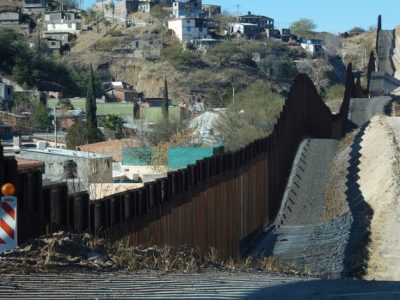Detention

California Governor Vetoes TRUST Act
In a disheartening development for immigrants’ rights advocates, California Governor Jerry Brown vetoed the TRUST Act on Sunday just hours before it was scheduled to take effect. The measure, which was intended to minimize the humanitarian impact of the federal Secure Communities program, would have largely prohibited state and local jails from detaining suspects on behalf of federal immigration authorities. Importantly, however, Gov. Brown rejected a central argument of the bill’s critics in his veto message and pledged to work with the California legislature to fix what he described as the flaws in the bill. Read More

Use of Segregation in Immigration Detention has Harmful Effects
The U.S. immigration system continues to detain more and more noncitizens in federally-operated detention facilities, in private prisons, and in state and local prisons and jails across the country. Currently, DHS detains approximately 34,000 persons every night, the majority of whom have no criminal history. Over the last several years there have been numerous reports on the miserable conditions found within these facilities. Read More

Immigrant Detention and the Private Prison Industry
The latest data on immigration enforcement show that U.S. Immigration and Customs Enforcement (ICE) detained a record high of 429,247 noncitizens in the 2011 fiscal year, an increase of 18 percent over 2010. Immigration detention has been steadily increasing over the last two decades. A new report by Justice Strategies suggests this increase is largely due to the efforts of private prison companies. Read More

Inspector General Finds Serious Problems with US-VISIT Program
The Department of Homeland Security’s (DHS) Office of Inspector General (OIG) recently released results of their investigation into the US-VISIT program. US-VISIT was created after 9/11 to track noncitizens’ entries into and exits from the U.S. to identify national security threats, individuals entering with fraudulent identities, and visa overstays. Through US-VISIT, fingerprints and digital photographs are taken of all noncitizens entering the U.S. and matched to biographical information. The exit portion of US-VISIT has never been fully implemented. Read More

California TRUST Act Awaits Governor’s Signature
The California TRUST Act (AB 1081) has now passed both houses of the state’s legislature and is awaiting Governor Jerry Brown’s signature. Passage of the TRUST Act would be an important step toward mitigating the harmful impact of the Secure Communities Program (S-Comm). Immigrant advocates from across the country are calling on Gov. Brown to sign the bill into law. Read More

Doing the Math: Immigration Detention Costs a Pretty Penny
By Dan Gordon, Communications Associate, National Immigration Forum. Congress will return to Washington after Labor Day amid talk of a “fiscal cliff,” yet loath to address the steep price American taxpayers shoulder to detain immigrants. Read More

For Immigrants, Alternatives to Detention Not All They’re Cracked Up to Be
On any given day, approximately 300,000 immigrants in the United States have pending removal proceedings to determine whether they will be deported from the country. Of those, about 10% are kept in detention centers while proceedings are pending, with the rest are subject to alternatives ranging from the posting of bail to the use of electronic ankle monitors. While few if any immigrants prefer to be detained, a recent report explains that many alternatives to detention (ATD) program impose hardships themselves. Read More

Immigrant Tax Contributions and the Future of the U.S. Economy
When it comes to the topic of immigration, Tax Day is a reminder of two important and often-overlooked points. First, immigrants pay billions in taxes every year. This is true even of unauthorized immigrants. Second, the federal government spends billions of taxpayer dollars each year on immigration-enforcement measures that wouldn’t be necessary if not for the chronic inability of Congress to reform our badly outdated immigration system. In other words, there is a strong fiscal case to be made for immigration reform. Were the U.S. immigration system to be given a 21st century overhaul, we would likely increase the tax dollars flowing from the immigrant community, and we would spend far less taxpayer money on immigration enforcement. Read More

Non-Deportable Immigrants Languish in Alabama Detention Center at Taxpayers’ Expense
Immigration violations are civil, not criminal infractions. But for many non-criminal immigrant detainees living alongside criminal inmates at the Etowah County Detention Center in Alabama, that distinction carries little meaning. Far removed from families and legal orientation programs, many of the 350 immigrant detainees housed at the Etowah Detention Center have received deportation orders, but for various reasons cannot be deported. Many are serving the maximum allowable time in detention, and are doing so under poor living conditions at a great cost to American taxpayers. In fact, a recent report by the Women’s Refugee Commission reveals that ICE continues to operate facilities like Etowah that fail to meet even its own detention standards. Read More

Human Rights Abuses Along U.S.-Mexico Border Underscore Need for Reform
U.S. immigration and border-enforcement policies have precipitated a litany of human-rights abuses along the U.S.-Mexico border, from the needless deaths of border-crossers to inhumane conditions in immigration detention to the racial profiling of entire Latino and indigenous communities. That was the principal finding of the human rights groups which presented testimony at a recent hearing of the Inter-American Commission on Human Rights (IACHR). It was also the main conclusion of a recent report by Amnesty International. Both the hearing and the report underscore the urgent need for the U.S. government to abide by the human rights treaties to which it is a signatory. Read More
Make a contribution
Make a direct impact on the lives of immigrants.
